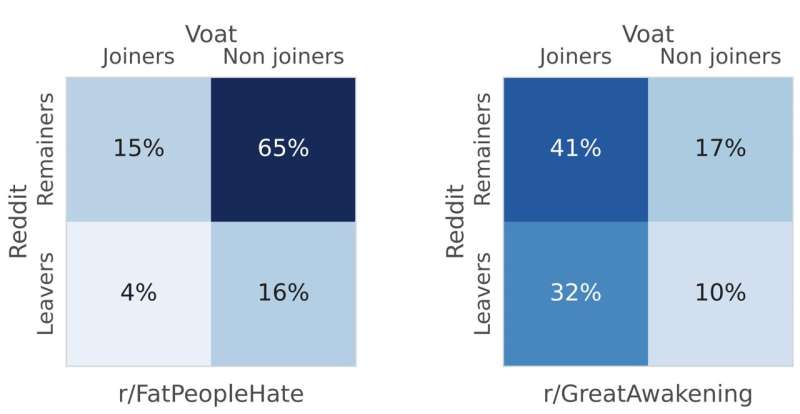This article has been reviewed according to Science X's editorial process and policies. Editors have highlighted the following attributes while ensuring the content's credibility:
fact-checked
peer-reviewed publication
proofread
Study: Online conspiracy communities are more resilient to deplatforming

Social media can incubate communities that are so resilient that even banning them from the platform cannot destroy them. Michele Starnini and colleagues studied two online communities on the social media site Reddit: the far-right conspiracy theory subreddit "GreatAwakening," which was banned in 2018, and the hate-speech subreddit "FatPeopleHate," banned in 2015. Both communities decided among themselves to move to Voat, an unmoderated Reddit clone designed to serve those banned by Reddit.
The authors of the study, appearing in PNAS Nexus, estimate that less than 20% of "FatPeopleHate" users migrated to Voat, while more than 70% of "GreatAwakening" users migrated to the new platform. This result suggests that members of "GreatAwakening" were more deeply engaged in the community and consequently willing to take more active steps to continue participating in it.
The authors found that once users migrated to Voat, community activity was lower than on the original Reddit boards. The level of toxicity, measured using a model hate speech classifier developed by the Innovative Monitoring Systems and Prevention Policies of Online Hate Speech project, was much higher on Voat than on Reddit, across both communities.
Notably, "GreatAwakening" users were much more likely to recreate their previous social network on the new platform than other users. Deplatforming hateful and conspiracy-minded groups on one platform may act as a filter, ensuring that only the most engaged, hateful, and toxic users participate in the group on its new platform, according to the authors, and social media moderators should consider this potential outcome when considering whether or not to ban a community.
More information: Corrado Monti et al, Online conspiracy communities are more resilient to deplatforming, PNAS Nexus (2023). DOI: 10.1093/pnasnexus/pgad324. academic.oup.com/pnasnexus/art … 93/pnasnexus/pgad324
Journal information: PNAS Nexus
Provided by PNAS Nexus





















